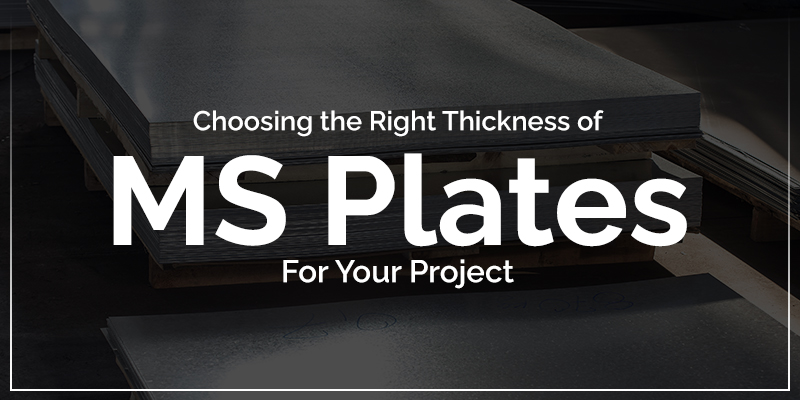One crucial factor when selecting MS plates for a project is the appropriate thickness. The thickness of MS plates plays a significant role in determining the structural integrity, load-bearing capacity, and overall performance of the fabricated components. Steel dealers understanding the factors that influence the choice of thickness and considering the specific requirements of your project can help you make an informed decision. Let’s explore the key considerations for choosing the right thickness for MS plates:
Load Requirements:
The load-bearing capacity of a structure is directly influenced by the thickness of the MS plates used. In applications with heavy loads, thicker plates are typically required to provide adequate strength and support. Analysing the anticipated loads and stresses the structure will endure is crucial in determining the appropriate plate thickness to ensure structural stability and safety.
Span Length:
The span length refers to the distance between supports or columns in a structure. Longer spans generally require thicker MS plates to ensure sufficient rigidity and prevent excessive deflection. Steel dealers in Chennai believe that the thicker plates offer increased resistance to bending and sagging, ensuring the overall stability and integrity of the structure. Consider the span length of your project when determining the suitable plate thickness.
Structural Design and Codes:
The structural design requirements and applicable building codes should be considered when choosing the thickness of MS chequered plate. Design codes often provide guidelines or specifications for minimum plate thickness based on factors such as the type of structure, intended use, and geographical location. Adhering to these codes ensures compliance with safety standards and that the structure meets the necessary structural requirements.
Environmental Factors:
Environmental factors, such as wind loads, seismic activity, or exposure to corrosive elements, can influence the choice of plate thickness. Steel suppliers say that in areas prone to high wind speeds or seismic activity, thicker plates may be necessary to enhance the structural integrity and resistance to external forces. Similarly, thicker plates with appropriate corrosion protection measures may be required in corrosive environments to ensure long-term durability.
Fabrication and Construction Considerations:
The fabrication and construction processes should also be considered when selecting the thickness of MS plates. Thicker plates may require more effort, time, and specialised cutting, bending, and welding equipment. Consider the capabilities of your fabrication team and the available resources to ensure a smooth and efficient fabrication process.
Cost Considerations:
The thickness of MS plates can impact the overall project cost. Thicker plates are generally more expensive than thinner ones. Therefore, it is essential to balance the structural requirements and the project’s budget constraints. Engaging in a cost-benefit analysis and consulting with experts can help you find the optimal thickness that meets both the structural needs and cost considerations.
Future Modifications or Upgrades:
JSW dealers suggest that while considering any potential future modifications or upgrades to the structure when selecting the thickness of MS plates. Anticipate the need for modifications or additional loads in the future. Selecting a slightly thicker plate may be prudent to allow for potential changes without compromising the structural integrity.
In conclusion, choosing the right thickness of MS plates is a critical decision that impacts the fabricated components’ performance, durability, and safety. By considering factors such as load requirements, span length, design codes, environmental factors, fabrication considerations, cost implications, and future modifications, you can make an informed choice. Consulting with structural engineers, fabricators, and industry professionals can provide valuable insights and guidance in selecting the optimal thickness to ensure the success of your project.

